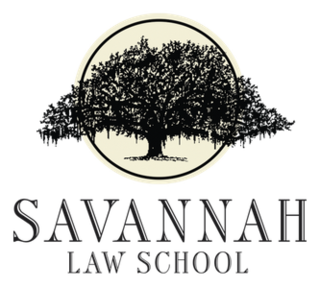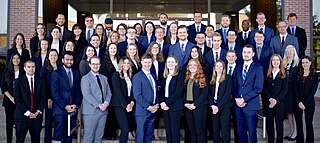
The Savannah Law Review was a scholarly law review journal focusing on current legal issues.

The Savannah Law Review was a scholarly law review journal focusing on current legal issues.
Savannah Law Review conformed all citations to The Bluebook: A Uniform System of Citation. For grammatical and style issues not addressed by The Bluebook, the Chicago Manual of Style controls.
Savannah Law Review's publication was set in Equity font, a typeface by Matthew Butterick. The journal was printed by Western Publishing, 537 East Ohio Street, Indianapolis, IN 46204.
Cite to Savannah Law Review as Savannah L. Rev. [1]
The Savannah Law Review began in 2013 and was a student-run law review publication at Savannah Law School. 2016 marks the law review's third volume. [2]
Using a competitive process that takes into account grades and performance on a writing exercise, the Savannah Law Review offered membership to student legal scholars at Savannah Law School. [3]
Each year, the Savannah Law Review held a colloquium at Savannah Law School which focused on pressing legal issues. The colloquium consisted of a keynote address by a leader in the field, and panels discussing new aspects of symposium's topic. These included:

The Bluebook: A Uniform System of Citation is a style guide that prescribes the most widely used legal citation system in the United States. It is taught and used at a majority of U.S. law schools and is also used in a majority of federal courts. Legal publishers also use several "house" citation styles in their works. The Bluebook is compiled by the Harvard Law Review Association, the Columbia Law Review, the University of Pennsylvania Law Review, and the Yale Law Journal. Currently, it is in its 21st edition. Its name derives from the cover's color.

The Denver Law Review is a law journal published by the students of the University of Denver Sturm College of Law. It was established in 1923 as the Denver Bar Association Record. In 1928, the journal was renamed Dicta and in 1968 it was renamed Denver Law Center Journal. The journal changed its name to Denver University Law Review in 1985. It adopted its current name in 2015. The College of Law began co-publishing the law review in 1949 and became the sole publisher in 1966.
The Wisconsin Law Review is a bimonthly law review published by students at the University of Wisconsin Law School. One issue each year is generally dedicated to a symposium or special topic.
The Cumberland Law Review is a law review published by the students at Cumberland School of Law in Birmingham, Alabama.
The Melbourne University Law Review is a triannual law journal published by a student group at Melbourne Law School covering all areas of law. It is one of two student-run law journals at the University of Melbourne, the other being the Melbourne Journal of International Law. Students who have completed at least one semester of law are eligible to apply for membership of the editorial board. Applicants are assessed on the basis of their performance in a practical exercise, academic aptitude, proofreading skills, editing skills and enthusiasm. The 2023 editors-in-chief are Isabella Conte, Nuria Khasim and Rajesh Varghese.
The University of Richmond School of Law is the law school of the University of Richmond, a private liberal arts college in Richmond, Virginia. Richmond Law is ranked 52nd (tie) in the US by US News, among the top five value law schools by the National Jurist, and one of the Princeton Review's 167 Best Law Schools of 2018.

The University of Pennsylvania Journal of International Law is a scholarly journal focusing on issues of international law, international relations, transnational law and comparative law. The Journal is published quarterly by an organization of second and third year law students at the University of Pennsylvania Law School. The journal is one of seven major scholarly journals at the University of Pennsylvania Law School and one of the top ten international law journals in the United States both based on citations and by impact.
The New England Law Review is a law review that was established in 1965 as the Portia Law Journal. It obtained its current name when Portia Law School changed its name to New England School of Law in 1969. It is run by students and currently publishes four issues annually. The review also conducts Fall and Spring symposiums.
The Syracuse Law Review, established in 1949, is a legal research and writing program for student editors at Syracuse University College of Law and a national forum for legal scholars who contribute to it. The editorial board publishes four Law Review issues annually, including the Annual Survey of New York Law.
The North Carolina Law Review is a law journal of the University of North Carolina School of Law. It publishes six issues each year as well as its online supplement, the North Carolina Law Review Forum.
A law review or law journal is a scholarly journal or publication that focuses on legal issues. A law review is a type of legal periodical. Law reviews are a source of research, imbedded with analyzed and referenced legal topics; they also provide a scholarly analysis of emerging law concepts from various topics. Law reviews are generated in almost all law bodies/institutions worldwide. However, in recent years, some have claimed that the traditional influence of law reviews is declining.
The Asian Law Review is an academic journal focusing on legal issues concerning Asia, published by an organization of J.D. and LL.M. students at the University of Pennsylvania Law School. One or two issues are published in each volume, with an occasional additional issue reprinting papers from a symposium held by the Law Review.
The Harvard Journal on Legislation is a journal of legal scholarship published by students at Harvard Law School.
The Institute for Consumer Antitrust Studies is a non-partisan, independent academic center designed to explore the impact of antitrust enforcement on the individual consumer and public, and to shape policy issues. It is located at Loyola University Chicago School of Law in Chicago, Illinois.
The City University of New York School of Law is a public law school in New York City. It was founded in 1983 as part of the City University of New York. CUNY School of Law was established as a public interest law school with a curriculum focused on integrating clinical teaching methods within traditional legal studies.

The Fordham Urban Law Journal is a student-run law review published at Fordham University School of Law. The journal publishes articles on a wide range of themes, with a focus on public policy and issues affecting urban areas.

Savannah Law School was a private, for-profit law school in Savannah, Georgia. It was associated with Atlanta's John Marshall Law School. The school ceased all operations by 2021 and is no longer accepting applications.
The Notre Dame Law Review is a law review published by an organization of students at the University of Notre Dame Law School in Indiana.

The Michigan State Law Review is a law review published by students at Michigan State University College of Law. It is the flagship journal of the school and it publishes five issues per year. According to the Washington & Lee Law Journal Ranking, Michigan State Law Review was the 48th highest-ranked flagship legal journal in 2022, a dramatic increase from its ranking of 332rd in 2003. The journal hosts an annual academic conference of global legal experts with past events covering issues such as autonomous vehicles, quantitative legal analysis, civil rights, and intellectual property. Professor David Blankfein-Tabachnick has served as Faculty Advisor of the journal since his appointment in 2016. In 2018, the journal began publishing an annual "Visionary Article Series," which features the work of one prominent legal scholar per year.
{{cite book}}: CS1 maint: location (link)